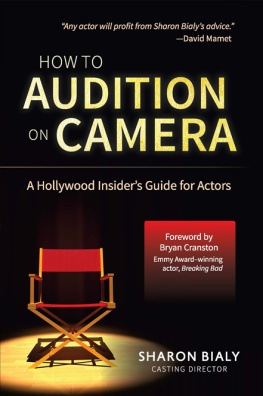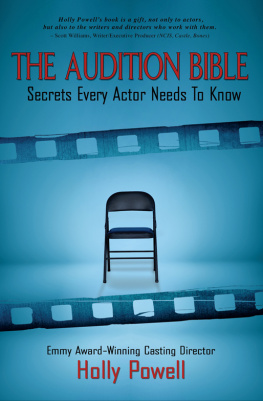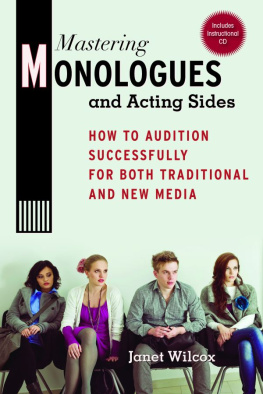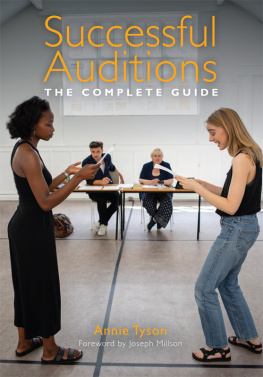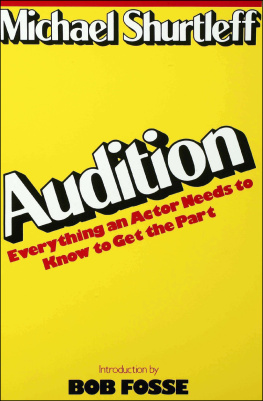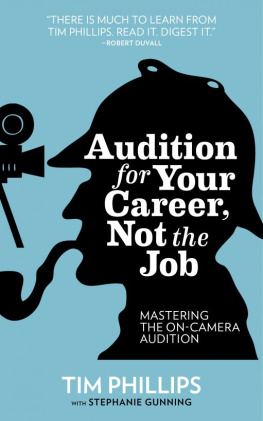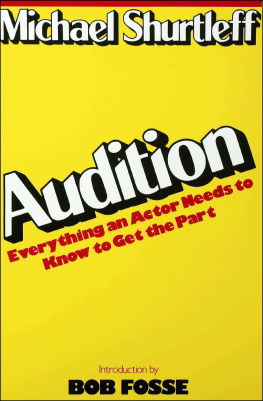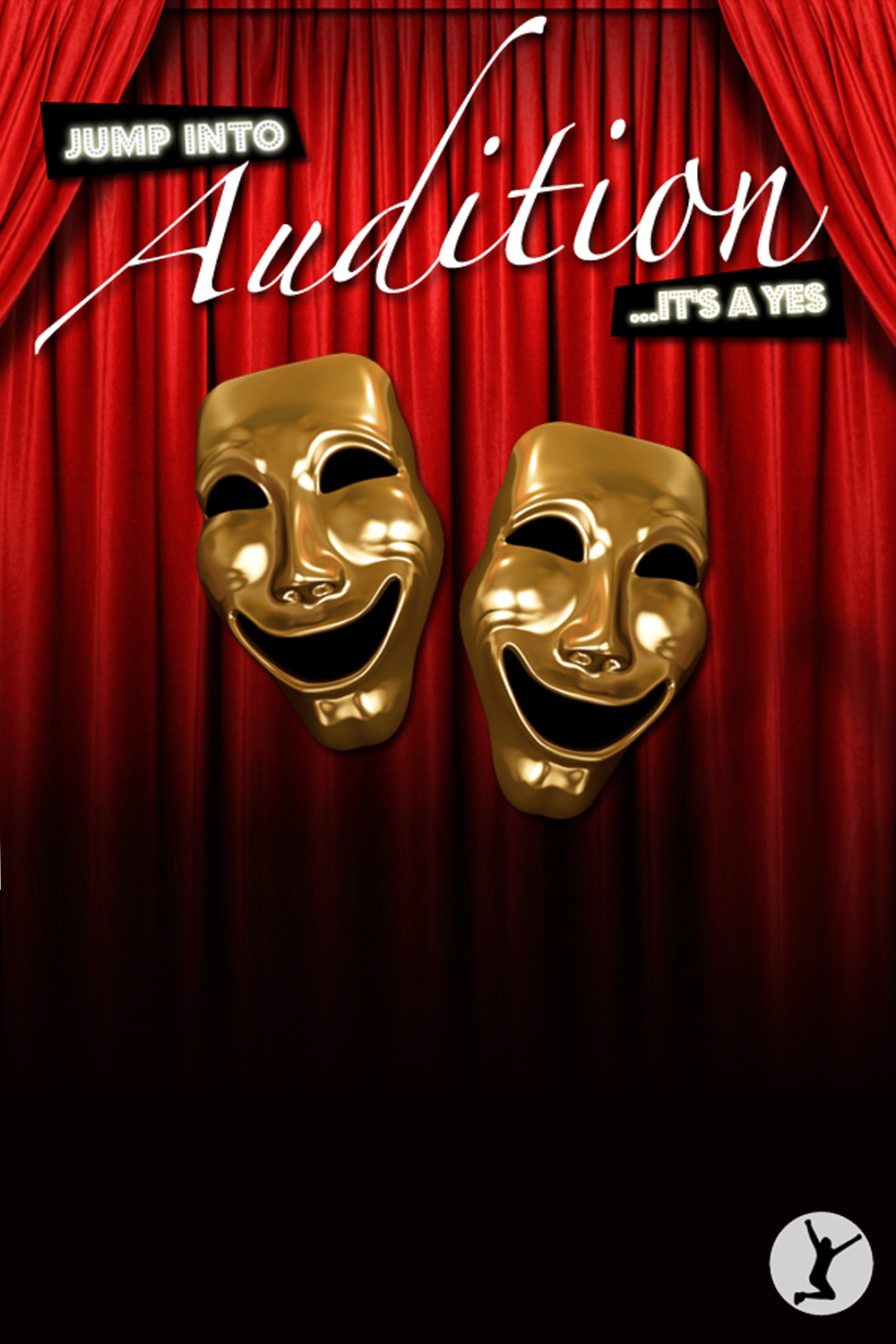JUMP INTO AUDITION...
Jump Into Audition... Its a Yes!
This book is sold subject to the condition that it shall not, by way of trade or otherwise, be lent, resold, hired out or otherwise circulated without the publishers prior written consent in any form of binding or cover other than that in which it is published, and without a similar condition being imposed on the subsequent purchaser.
Introduction
Every Saturday evening, many of us sit down to watch one talent show or another on TV. We are often amazed and truly entertained by some of the wonderful talent that is discovered. We also get to laugh at those who are fooling themselves by thinking they have what it takes to become a star. What we dont see or appreciate however, is the anxiety of the contestants who wait for hours for their name to be called and their audition to take place, in front of not only a panel of celebrities but the entire nation. For performers, auditions are unfortunately a fact of life. Almost everyone, regardless of age or experience, is nervous about auditioning but believe it or not, that nervousness can be a positive thing, giving your performance a passion and focus that perhaps might not be there otherwise. Yes, thats right, that feeling of having butterflies in your tummy, that fear of forgetting your lines and not only embarrassing yourself but being rejected is absolutely normal and is not a sign that youre going to be terrible at your audition.
However, there are some for whom nervousness causes real problems, to the extent that their uncomfortable feelings gradually increase over time to eventually become the sole focus of their attention and negatively affect their performance. Often, they imagine making a mistake and embarrassing themselves, repeating this scenario in their minds before an audition. As a result, they often develop a dry mouth or throat, affecting their vocal performance. In extreme cases, they may feel or actually be sick.
Many experienced performers learn over time, to not necessarily overcome, but certainly to work with these problems by using psychological and breathing techniques to slow down their heart rate, focus their concentration and make the most of their audition.
Nowadays, with the increased popularity of talent shows, there is more pressure on teenagers and young adults to be able to deliver polished performances without the added benefit of experience. To make matters worse, some of the judges on programmes such as these are encouraged to be as critical as possible, to make for good TV viewing. If you are seriously affected by extreme nervousness or stage fright, there is help available and we will go on to discuss what to expect in an audition and techniques you can use to make sure you give the best performance possible. Lets begin with your preparation.
Chapter 1
Preparation
You should begin preparing for your audition in plenty of time at least the day before. It helps if you realise that you are unlikely to be 100% happy with your performance. There will always be aspects of it that you feel you could do better, but by preparing fully you will be confident that you know the material and will be less likely to make a mistake. Learn to trust your autopilot! Make sure you have a good nights sleep beforehand and eat a light meal shortly before the audition. This ensures you will be able to concentrate and it reduces the chance of developing an upset stomach, which could lead to feelings of sickness.
Prepare a checklist and pack everything that you need the day before. Include a small bottle of water, a light lunch, sheet music or your backing tracks if appropriate, makeup, your costume and money. You should also take something to read as you could have to wait around for some time until its your turn. Headphones are not a good idea, as you could miss your cue if you cant hear properly.
Once you arrive at the audition, you should check in and find out the approximate time you will be expected on stage. If it will be a few hours, try and relax, read your book and have something to eat and drink. Once you have about an hour to go, however, you need to start practising your vocals and breathing techniques.
When walking out on stage, greet the accompanist if there is one, say hello to the judges and introduce yourself. The judges may ask you a few questions including why you have applied to audition and in some cases, why you have chosen their particular company or why this particular part. These will be the standard questions so if they apply to your audition, have a short, prepared answer ready. Remember also to thank the judges and accompanist at the end.
Of course, this all sounds very calm and straightforward. However, the chances are that you will be considerably more nervous than this and perhaps envious of the more experienced performers around you who seem in control and self-assured. Would it shock you to know that the majority of people in the room with you feel exactly the same way, regardless of how much experience they have? They have probably learned over time how to disguise their uncomfortable feelings.
Worrying about your performance is completely normal but it can lead to problems if insecure performers actually judge themselves during an audition. This provides no benefit whatsoever. It distracts the performer and in most cases, ruins their audition. Stay in the present moment and focus completely on what you are doing, not on how you are being judged.
Remember above all that you are a performer. This is what you enjoy doing. Youve worked hard to get this far and this is a fantastic opportunity for you to show just how good you are. Dont think of an audition as an exercise in judgement; think of it as your opportunity to be noticed and for you to shine. The truth is that the judges really want you to do well. They are hoping to see your talent.
Positive visualisation may have a startling effect on your self-confidence. Trick your mind into thinking you have already delivered the performance of a lifetime and the judges have been totally blown away. By doing this you will be more likely to step out onto that stage and give it your all.
There are many books, CDs and DVDs which may help you with meditation techniques. Shortly before you are due on stage, use these techniques so that you are calm and focused. Make sure you are breathing in a deep, steady, controlled manner so that your brain is receiving enough oxygen and your voice is strong. Focus your thoughts on something other than your performance or your feelings of nervousness and try to change those feelings into something more positive, such as anticipation or excitement.
It is worth realising that you wont be successful in every audition you do. No one is. It is part and parcel of show business and seasoned performers accept this. However, rejection is never pleasant and in the next chapter we will look at coping with it in a little more depth.
Chapter 2
Surviving the audition and the fear of rejection
There are several approaches to dealing with rejection. For some, it is to cushion the blow by adopting a mindset telling them that because success is unlikely they should just look upon the audition as a useful tool for development. This is fine, as long as you do not then start going to every audition with the preconception that you are going to fail and therefore you dont need to give it your all you should give 100%, every time, otherwise you will begin to develop a poor reputation and a losing mentality.





